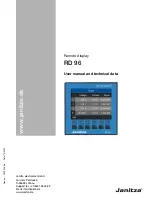Reviews:
No comments
Related manuals for miniCHEM-Sal

UD46E-A
Brand: Samsung Pages: 2

400DX-2 - 40IN LCD 1920X1080 3000:1 VGA Dvi
Brand: Samsung Pages: 28

400DX-2 - 40IN LCD 1920X1080 3000:1 VGA Dvi
Brand: Samsung Pages: 29

RD 96
Brand: janitza Pages: 30

W03
Brand: Jamr Technology Pages: 24

L151p
Brand: ThinkVision Pages: 36

SmartGLCD 240x128
Brand: mikroElektronika Pages: 37

LMD9014
Brand: OSEE Pages: 28

ProLite T1932MSC
Brand: Iiyama Pages: 1

dynamics 44 6085 S
Brand: Ofa Bamberg Pages: 18

MD3110
Brand: G-Lab Pages: 25

CS19108R215P
Brand: Chipsee Pages: 14

NSD 1705-00096
Brand: Startax Pages: 31

Digital VTH
Brand: Dahua Pages: 20

VG2847Smh
Brand: ViewSonic Pages: 26

V-LCD101MD
Brand: Marshall Electronics Pages: 16

210S
Brand: AOS Pages: 54

SyncMaster 753DF
Brand: Samsung Pages: 56


















